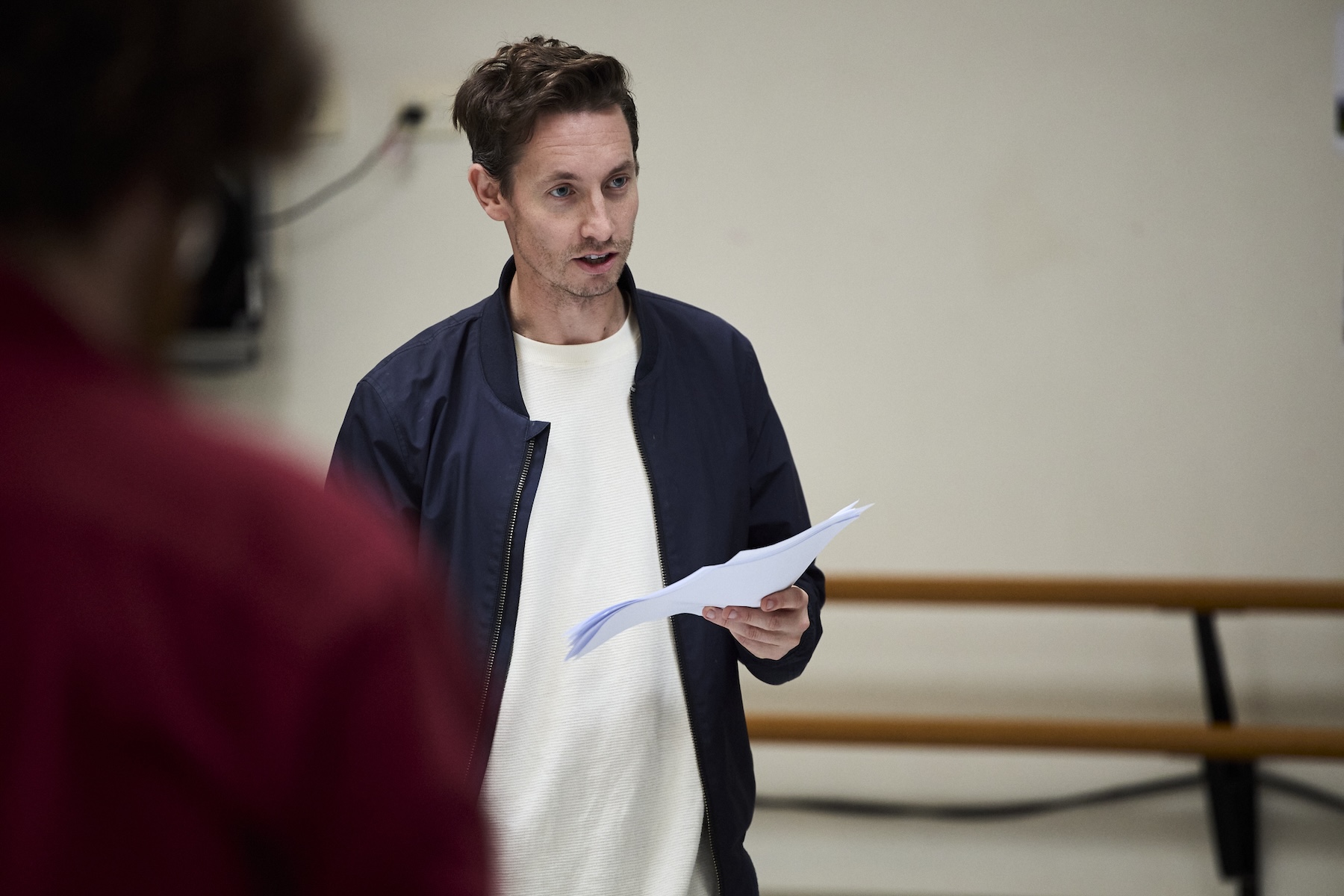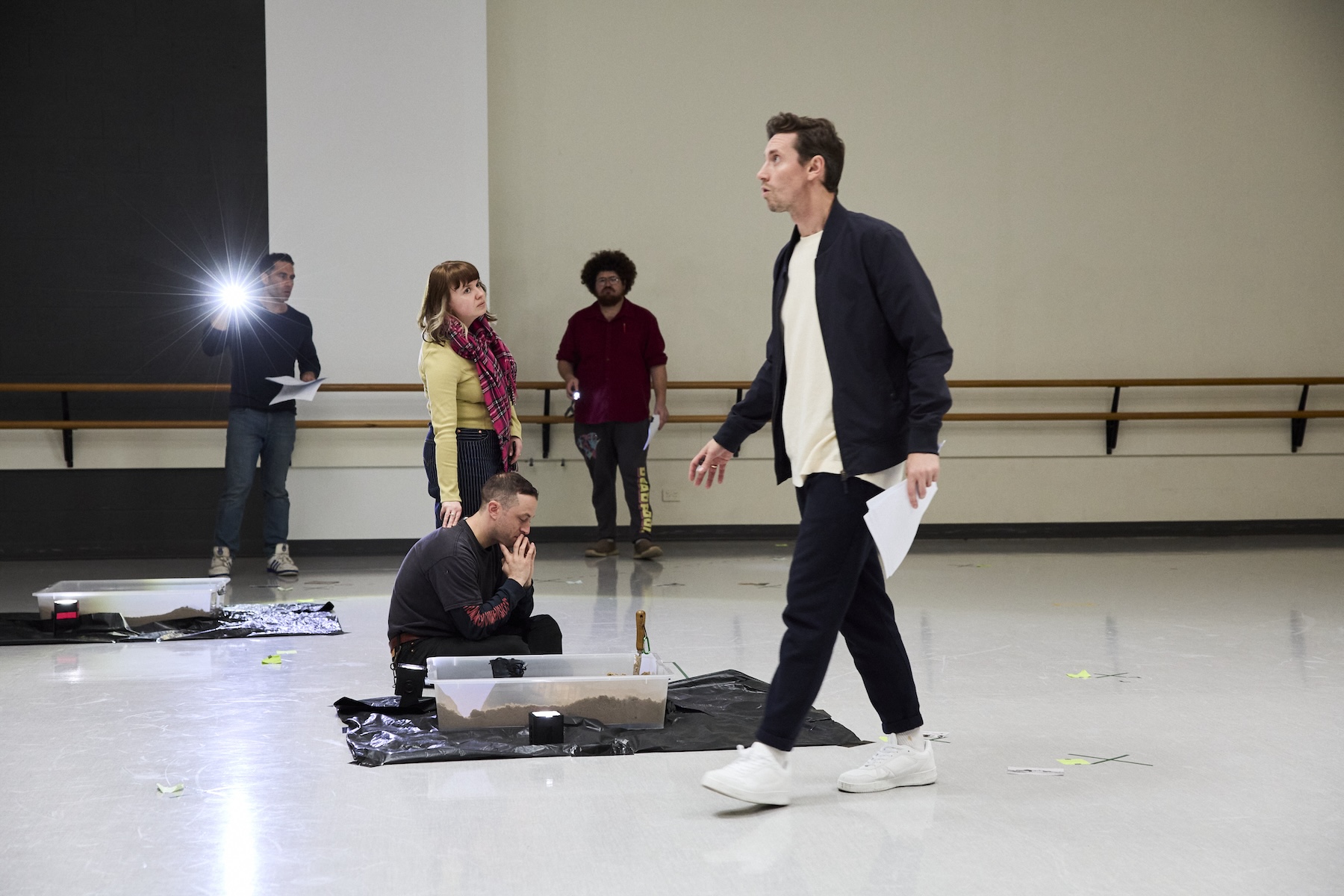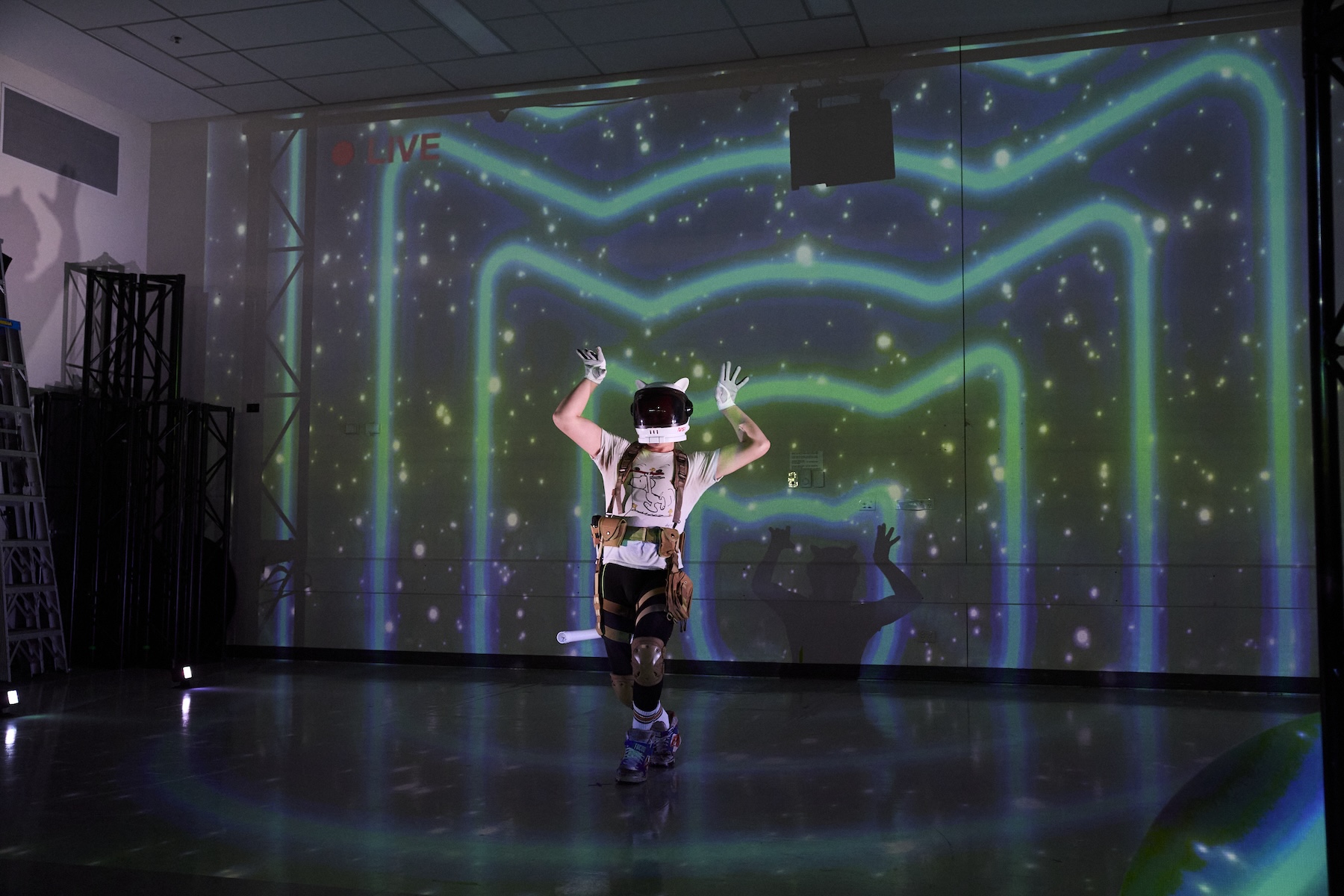‘It’s so rare’: Indie-Mill encourages artists to dig deep for young audiences
Actor Matt Crook has drawn on the story of his pioneering Pop and the deep time of the Flinders Ranges for a work being brought to life as part of Windmill Theatre’s new initiative supporting independent artists.



“You can’t talk about the Flinders Ranges like it’s one thing, one place. It’s a hundred places all stitched together; a thousand stories weaved across time…”
Actor James Smith is addressing an imaginary audience as he channels Fred, a character who grew up on this land “about a hundred years ago” and is acting as the guide on a journey which takes place “outside space and time”.
Script in hand, Smith moves with purpose across the mapped floor of a large studio space where locations such as Hawker, Port Augusta, Quorn, Leigh Creek, Wilpena Pound and Arkaroola are represented by crosses fashioned from green tape and accompanied by sticky notes and old photos.
Watching on and jumping in to portray other characters or share ideas for dramaturgy and choreography are fellow ensemble members Matt Crook, Annabel Matheson, Kyron Weetra and Chris Asimos. A quickly improvised game of chasey offers a neat segue for the delivery of a letter like a relay baton, while a series of ad hoc props stand in for a bucket that morphs into damper cooked over an open fire and later a package being passed from train driver to truckie. And how about this piece of music as a soundtrack to Fred’s narrative?
There’s a raw and infectious energy in the room as the team explores how the work — titled Dig and written and co-directed by Crook — might come to life for an audience.
They are part of Windmill Theatre’s new program Indie-Mill, which the company describes as “a chance for makers to take creative risks and tell unique stories that challenge and inspire young people”. Teams of independent artists were invited to pitch original ideas for Indie-Mill, and the four successful groups – comprising 22 artists in total – are this month undertaking a paid, two-week creative development across various spaces at Windmill’s home at in Light Square.
“It’s so rare… to be given this opportunity and platform — I’m pinching myself,” says Crook, who pitched his concept with performers Matheson (also co-director), Smith, Weetra and Asimos, and designer Olivia Zanchetta.

You might like
“To have the support, not just financially, but also the infrastructure… like, the literal space, the equipment, and assistance from stage managers.”
Crook, whose extensive acting resume includes many roles with Windmill and State Theatre Company of SA, is an emerging writer who has based the character of Fred on his late grandfather, Fred Teague.
A local legend in the Flinders Ranges, Teague was born in Olary and from an early age helped his widowed mum run the pub in the now-abandoned goldfields town of Waukaringa. His went on to do a range of different jobs in the outback — including gold prospecting, fencing, fox shooting and truck driving — before becoming a mailman along the Birdsville Track and then opening Hawker Motors in the early 1950s.
Today, Crook’s uncle runs Hawker Motors, which includes a store, service centre and Fred Teague’s Museum, where visitors will find minerals, gemstones, fossils, photos and an eclectic range of memorabilia collected by Fred.
Crook was only eight when his grandfather died, but was inspired to learn more about him after listening to an interview Teague did with journalist John Francis in 1967.
“I was hearing Pop’s voice when he was younger — it was amazing. I had chills listening to it.”

Crook says Teague was an amateur geologist who spoke about Ediacaran fossils in the interview with Francis while also reflecting on the impact of colonisation on the region’s environment — and testified to the brutal treatment of the Adnyamathanha community by settlers. He was a natural storyteller, which made him an ideal conduit for a show that will shine light on other fascinating stories from the Flinders Ranges.
“This work is a bit of a metaphor for my own journey of discovery — wanting to dig into the past — and then there are all these other stories that are buried,” Crook explains.
“I think what really seems to work with plays or movies or books or stories is the more specific you get, the more universal something becomes. And I also like the idea of honouring his [Fred’s] memory. That character is doing what Pop did: he’s connecting different threads and stories and people, and teaching, educating or entertaining.”
Subscribe for updates
"Some stories may just stay buried, which is like real life."
Another character likely to pop up in Dig is geologist Reg Sprigg, who discovered the 500-million-year-old Ediacaran fossils in the Flinders Ranges in 1946. Adding a playful element to the work will be “Barry” the Diprotodon, inspired by the giant wombat-like prehistoric marsupials whose bones have been uncovered in SA’s far north and other parts of Australia.
Crook has worked with all the members of his ensemble on previous shows, and notes that Smith and Weetra also have a personal connection to the Flinders Ranges.
Connections, he says, are at the heart of Dig, which he hopes will ignite curiosity in viewers. One of the elements the team is exploring during the creative development is how audience members will get to select which stories play out on stage in a kind of ‘choose your own adventure’.
“It’s like this interactive theatrical experience where you can choose to jump between moments in time and space… as a performer, there’s something exciting about knowing roughly where you’re going to go and the beats you have to hit but also knowing that might change every show.

“The other thing I really like is the idea of preparing more stories or vignettes than what is selectable, and that some stories may just stay buried, which is like real life.”
The other teams involved in Indie-Mill include performers and creatives such as Tilda Cobham-Hervey, Elizabeth Hay, Emma Beech, Ashton Malcolm, Alexis West, Erin Fowler and Hew Parham. The concepts they are developing range from a one-man show about a cat’s space odyssey to a work that weaves together Australia’s First Nations and settler history.
Windmill artistic director Clare Watson says 35 teams applied to be part of Indie-Mill.
“The quality of them was extraordinary,” she says, adding that the entire Windmill staff read all the applications.
“It was a wonderful, rigorous process with lots of great conversations, and having the whole team as a part of that felt really valuable. We’re all very invested in the program.”
The four teams selected for the inaugural Indie-Mill are undertaking their two-week creative development at the same time and have access to a large green room, which Crook says fosters a sense of camaraderie. Windmill has also provided each team with a stage manager, assistant stage manager and technical support.
While all the works-in-development will have an informal showing on July 19, Watson says Windmill has not set any expectations for longer-term outcomes.
“What we wanted to do as a company was to invest in these artists and their ideas, and it’s not with a view to future programming… the key intention is just more new work for young audiences.
“It is their work and they maintain the IP for their work throughout the entire process. That feels really important… [but] if it’s really fantastic and they want to keep working with us, we would love that.”
Learn more about Windmill Theatre Theatre Co and Indie-Mill here
Free to share
This article may be shared online or in print under a Creative Commons licence

